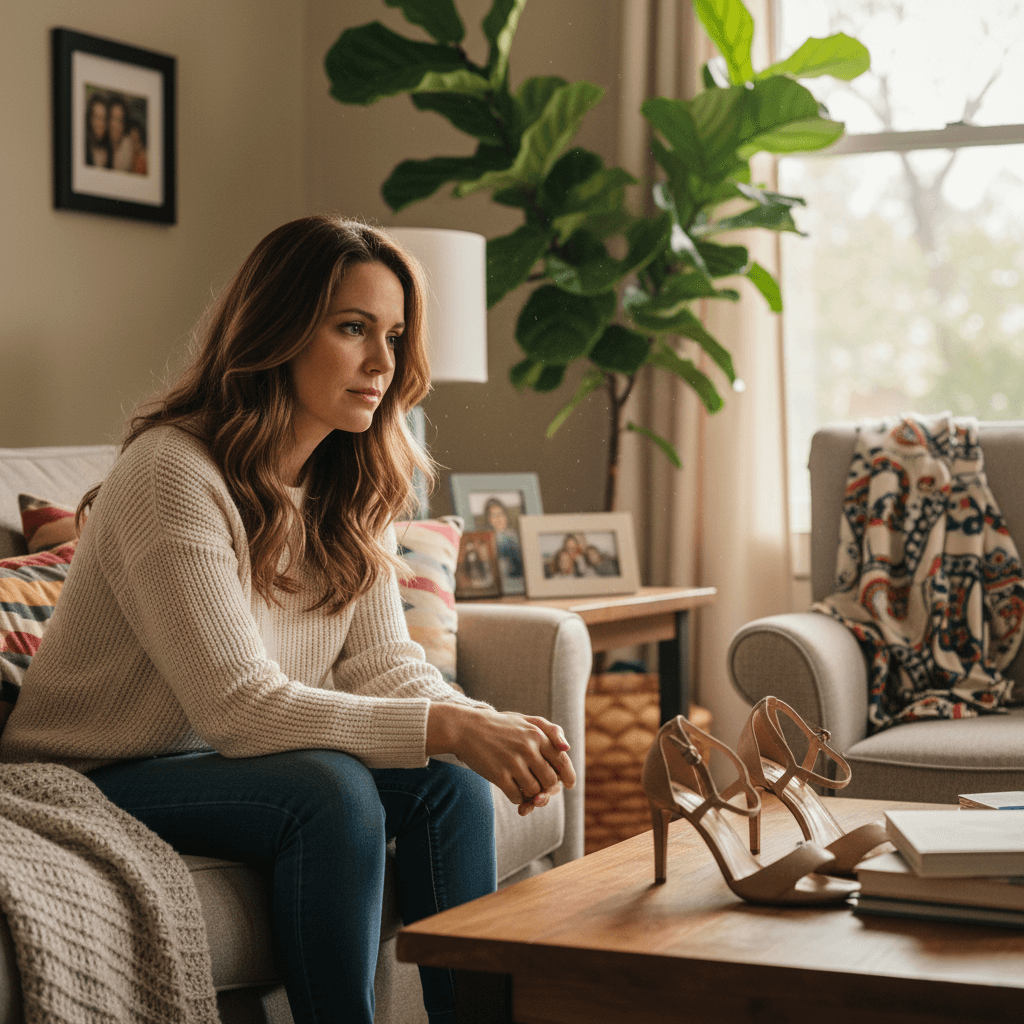Where Every Connection Becomes a Bond

There was a time when everything felt like an adventure. When saying “yes” was automatic. When she had energy for spontaneous nights out, endless social events, and the kind of freedom that comes with not knowing what consequences might follow.
Then something shifted. Not all at once, but gradually. She stopped enjoying things she used to love. And she stopped apologizing for it.
This isn’t depression. This isn’t bitterness. This is clarity. This is a woman who’s lived enough to know what’s worth her time and what isn’t. This is a woman who’s learned the true cost of certain experiences and decided the price is too high.
1. People-Pleasing and Endless Social Obligations
She’s done performing for people who don’t matter.
In her 20s, she said yes to every invitation. She worried about disappointing people. She managed other people’s feelings about her choices. She performed the version of herself that everyone wanted.
By 30, she’s exhausted. She’s learned that saying yes to everything means saying no to nothing—including to herself. She’s stopped trying to be liked by everyone and started being selective about who gets her time and energy.
She cancels plans without extensive explanations. She turns down invitations that don’t excite her. She stops attending events just to maintain appearances. And she’s okay with the disappointment on other people’s faces because she’s finally prioritizing her own peace.
2. Putting Everyone Else’s Needs Before Her Own
She’s stopped martyring herself.
She used to sacrifice. She’d give up her needs for her family’s comfort. She’d skip meals to finish work. She’d put her dreams on hold because someone else’s timeline was more urgent.
Now, she’s learned that nobody values sacrifice except for the person making it. Her family expects it. Her employer takes advantage of it. And she’s left exhausted and resentful.
By her 30s, she’s started the radical act of prioritizing herself. She eats when she’s hungry. She rests when she’s tired. She pursues her goals even if it disrupts someone else’s convenience. And yes, this sometimes makes people uncomfortable. But she’s learned that their discomfort is not her responsibility to manage.
3. Casual Relationships With No Depth
She’s done with surface-level connections.
In her 20s, she could maintain dozens of friendships—acquaintances she’d see occasionally, people she’d chat with at parties, friends-of-friends who were nice enough but not meaningful.
By 30, she’s realized that shallow friendships are just another form of emotional labor with no payoff. She’d rather have three deep friendships than thirty acquaintances. She’s stopped trying to maintain relationships that feel obligatory. She’s pruned her social circle to only include people who genuinely add value to her life.
These aren’t mean decisions. They’re boundaries. And she’s finally comfortable with them.
4. Staying in Unhappy Situations for Fear of Being Alone
She’d rather be alone than be with the wrong person.
Twenty-something her would stay in unsatisfying jobs, toxic friendships, or mediocre relationships because being alone felt terrifying. At least these situations were familiar. At least she had something.
Thirty-something her has learned that being alone is better than being lonely with someone. She’s learned that the pain of being mistreated often exceeds the fear of starting over.
She leaves jobs that don’t serve her. She walks away from people who drain her. She ends relationships that aren’t working. And she does it without waiting for the perfect moment or until she has another option lined up. She’s learned that sometimes you just have to jump and trust that you’ll figure it out.
5. Constantly Seeking Validation and Approval
She’s stopped needing other people to tell her she’s enough.
At 25, she was constantly looking for external validation. Did that guy like her? Did her boss approve of her work? Did her friends think she was cool? Did her mother think she made the right choice?
By 35, she’s learned that seeking validation from others is an endless game she can never win. There will always be someone who doesn’t like her, doesn’t approve, doesn’t understand. And that’s okay.
She stopped posting to get likes. She stopped dressing to impress people she doesn’t care about. She stopped seeking approval for her life choices. She’s learning—slowly and sometimes painfully—to be her own source of validation.
6. Trying to Change or Fix Other People
She’s stopped believing she can save someone.
Twenty-something her was full of hope that love could change people. That if she just loved him enough, supported him enough, believed in him enough—he’d become who he needed to be.
By her 30s, she’s learned that people change when they want to change, not when someone else decides they need to. You can’t fix someone who doesn’t want to be fixed. You can’t change someone who’s not willing. You can’t love someone into being healthy.
She’s stopped investing in “projects.” She’s stopped trying to rescue broken men or damaged women. She’s learned to accept people as they are or walk away. And while this sounds harsh, it’s actually the most loving thing she can do—for them and for herself.
7. Pretending to Be Someone She’s Not
She’s stopped performing an inauthentic version of herself.
She used to have a work persona, a family persona, a friend persona. She’d shift her personality depending on who she was with. She’d hide parts of herself that didn’t fit the image.
By 30, she’s too tired to perform. She’s learned that trying to be palatable to everyone means being authentic to no one. The people who matter will accept her as she is. The people who need her to be different can find someone else.
She stops laughing at jokes she doesn’t find funny. She stops pretending to be interested in things that bore her. She stops softening her edges to make others comfortable. She becomes increasingly willing to let people see exactly who she is—and increasingly okay with their reactions to that.
8. Romantic Gestures From Someone Who’s Not Present
She’s stopped accepting crumbs and calling it love.
In her 20s, she’d accept one beautiful gesture—flowers, a romantic dinner—and overlook 365 days of emotional neglect. She’d mistake grand romantic moments for actual love and commitment.
By 30, she knows the difference between performative romance and consistent presence. She’d rather have a man who shows up emotionally every day than one who sends flowers while ignoring her during difficult seasons.
She’s stopped settling for breadcrumbs of attention. She’s learned that real love is demonstrated through daily choices and consistent effort, not through occasional theatrical gestures.
9. Trying to Look Young
She’s stopped fighting her age and started accepting it.
Not because she’s “given up,” but because she’s finally realized that the cost of constantly fighting time is far higher than the cost of aging gracefully.
She used to spend hours trying to hide wrinkles, fearing grey hair, obsessing over staying “young and relevant.” By her 30s and beyond, she’s recognized that aging is a privilege, not a punishment. Not everyone gets to do it.
She’s stopped trying to look 25. She’s learning to dress for herself instead of for how young she looks. She’s allowing her laugh lines to show. She’s coloring her grey hair or letting it silver—because she wants to, not because she’s afraid.
10. Staying In Situations Just Because They’re Comfortable
She’s stopped choosing comfort over growth.
At 25, she’d stay in a job because it was easy. She’d stay in a relationship because leaving was harder than staying. She’d stay in situations that weren’t serving her because at least they were familiar.
By 30, she’s learned that comfort is often just another word for stagnation. She’s learned that growth happens outside of comfortable spaces.
She leaves jobs even without another one lined up. She ends relationships even though it means disruption. She pursues dreams even though it’s uncomfortable and uncertain. She’s learned that the slight discomfort of change is vastly preferable to the slow death of staying comfortable in the wrong situation.
What This Actually Means
This isn’t about becoming bitter or cynical. It’s about wisdom.
A woman over 30 who’s stopped enjoying these things hasn’t lost her capacity for joy. She’s simply gotten smarter about where she invests her joy. She’s learned that her time, her energy, and her emotional resources are finite and valuable.
She’s stopped spending them on things that don’t matter. She’s stopped performing for people who don’t care. She’s stopped sacrificing herself for others who wouldn’t do the same.
She’s become selective. She’s become real. She’s become unapologetically herself.
The Gift of This Shift
The most beautiful part of this evolution is that it creates space for what actually matters.
When she stops saying yes to everything, she can say a real yes to the things that matter. When she stops performing, genuine connection becomes possible. When she stops trying to save others, she can finally save herself.
By 30, a woman has often figured out that life is too short for half-measures. She’s decided to invest in depth over breadth, authenticity over performance, presence over pretense.
And yes, some people will call her difficult or too much or not fun anymore. But those people are probably the ones she’s stopped performing for anyway.




